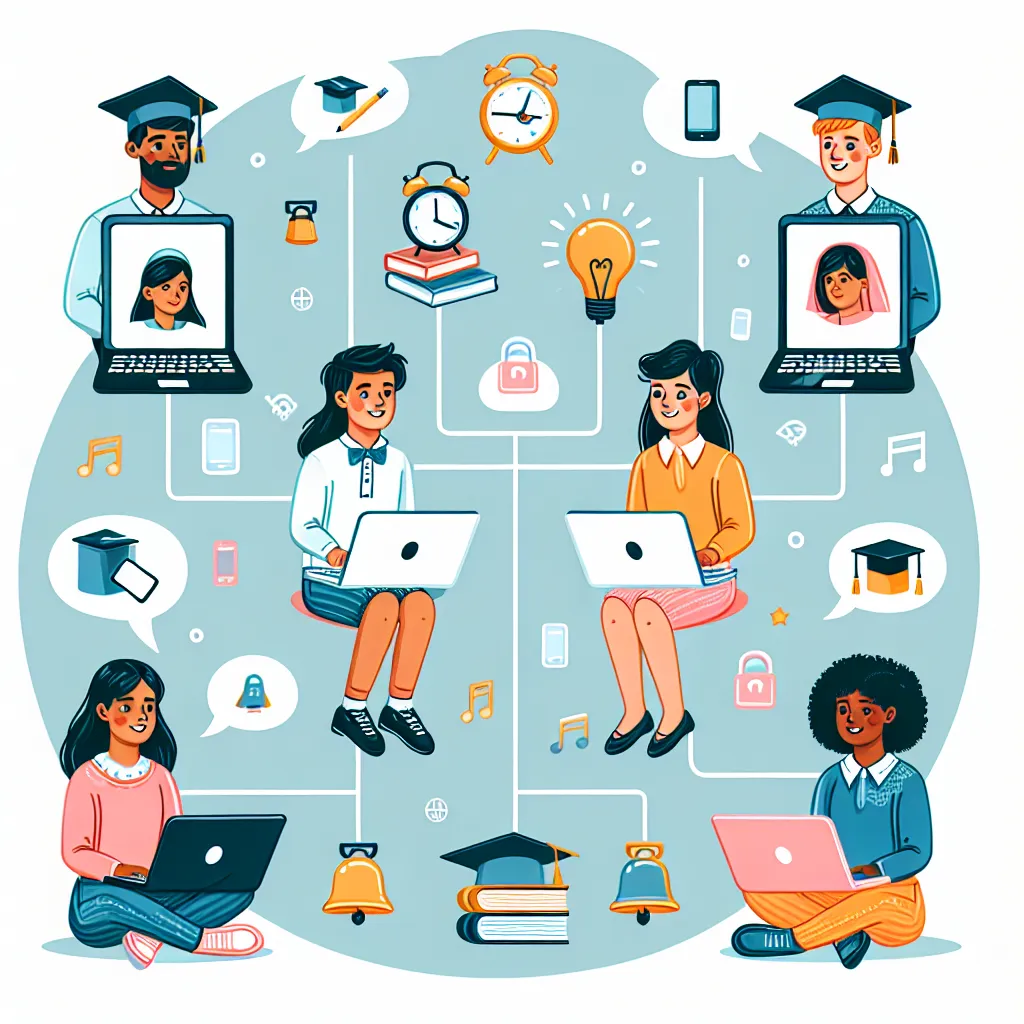In this IELTS Reading practice, we’ll explore “The rise of remote learning platforms in education” – a topic that has gained significant importance in recent years. This practice test will help you prepare for the IELTS Reading section by providing a comprehensive set of passages and questions that mirror the actual exam format. Let’s dive into the world of online education and test your reading skills!
Nội dung bài viết
- IELTS Reading Practice Test
- Passage 1 (Easy Text)
- The Emergence of Remote Learning
- Questions 1-5
- Questions 6-10
- Passage 2 (Medium Text)
- The Impact of Remote Learning on Traditional Education Systems
- Questions 11-14
- Questions 15-20
- Passage 3 (Hard Text)
- The Socioeconomic Implications of Remote Learning Platforms
- Questions 21-26
- Questions 27-32
- Questions 33-35
- Answer Key
- Passage 1
- Passage 2
- Passage 3
- Conclusion
 Remote learning platforms transforming education
Remote learning platforms transforming education
IELTS Reading Practice Test
Passage 1 (Easy Text)
The Emergence of Remote Learning
The landscape of education has undergone a dramatic transformation in recent years, largely due to the proliferation of remote learning platforms. These digital tools have revolutionized the way knowledge is disseminated and acquired, breaking down traditional barriers to education.
Remote learning platforms offer a multitude of advantages. Firstly, they provide unprecedented accessibility, allowing students from diverse geographical locations to access high-quality educational content. This democratization of education has opened doors for individuals who might otherwise be excluded from traditional learning environments due to physical, financial, or social constraints.
Moreover, these platforms offer flexibility in terms of scheduling and pacing. Learners can engage with course materials at times that suit their individual needs and progress at their own speed. This self-paced approach accommodates different learning styles and allows for a more personalized educational experience.
The interactive nature of many remote learning platforms also enhances engagement. Through features such as discussion forums, live chat sessions, and collaborative projects, students can interact with peers and instructors from around the globe, fostering a rich, multicultural learning environment.
However, the rise of remote learning is not without challenges. Issues such as digital literacy, access to technology, and the need for self-discipline can pose significant hurdles for some learners. Additionally, the lack of face-to-face interaction may impact social skill development, particularly for younger students.
Despite these challenges, the potential of remote learning platforms to revolutionize education is undeniable. As technology continues to advance and educational methodologies evolve, these platforms are likely to play an increasingly central role in shaping the future of learning.
Questions 1-5
Do the following statements agree with the information given in the passage?
Write:
TRUE if the statement agrees with the information
FALSE if the statement contradicts the information
NOT GIVEN if there is no information on this
- Remote learning platforms have made education more accessible to people from different locations.
- All students prefer remote learning over traditional classroom settings.
- Remote learning platforms allow students to study at their own pace.
- Digital literacy is not a concern for users of remote learning platforms.
- Remote learning platforms are expected to become more important in education in the future.
Questions 6-10
Complete the sentences below.
Choose NO MORE THAN TWO WORDS from the passage for each answer.
- Remote learning platforms have led to a __ of education.
- These platforms provide __ in terms of when and how quickly students can learn.
- The __ features of many platforms help to keep students engaged.
- One challenge of remote learning is the potential impact on __ development.
- As educational methods and technology progress, remote learning platforms will likely play a(n) __ role in education.
Passage 2 (Medium Text)
The Impact of Remote Learning on Traditional Education Systems
The exponential growth of remote learning platforms has sent shockwaves through traditional education systems worldwide. This digital revolution is not merely supplementing existing educational paradigms; it is fundamentally reshaping them, challenging long-held assumptions about the nature of learning and the role of educational institutions.
One of the most significant impacts has been the blurring of boundaries between formal and informal education. Remote learning platforms have created a vast ecosystem of knowledge that exists outside traditional academic structures. Massive Open Online Courses (MOOCs), for instance, offer university-level education to anyone with an internet connection, often at a fraction of the cost of traditional degree programs. This democratization of higher education has forced many institutions to reassess their value proposition and adapt their offerings to remain competitive.
The rise of remote learning has also catalyzed a shift towards more personalized learning experiences. Advanced algorithms and artificial intelligence can now analyze a student’s performance data to create tailored learning pathways, adapting content and pacing to individual needs. This level of customization was previously impossible in traditional classroom settings, where a one-size-fits-all approach often prevailed.
Furthermore, remote learning platforms have accelerated the adoption of new pedagogical approaches. The flipped classroom model, where students engage with lecture content at home and use class time for interactive activities, has gained traction. This approach maximizes the value of face-to-face interaction time, focusing on application, discussion, and problem-solving rather than passive knowledge transmission.
However, the integration of remote learning into traditional education systems is not without its challenges. Issues of equity and access persist, with concerns about the digital divide potentially exacerbating existing educational inequalities. Additionally, the shift to remote learning has highlighted the importance of digital literacy skills, not just for students but for educators as well.
The impact on assessment methods is another area of significant change. Remote learning platforms have necessitated a move away from traditional exam-based assessments towards more continuous, project-based evaluation methods. This shift aligns with a growing emphasis on skill development and practical application of knowledge rather than mere information retention.
As remote learning continues to evolve, its influence on traditional education systems is likely to deepen. The future of education may well be a hybrid model, blending the best aspects of remote and in-person learning. This model could offer the flexibility and personalization of online platforms while retaining the social and hands-on elements of traditional classroom experiences.
In conclusion, the rise of remote learning platforms is not just changing how education is delivered; it is redefining what education means in the 21st century. As these platforms continue to develop and integrate with traditional systems, they have the potential to create more inclusive, effective, and engaging learning experiences for students around the world.
Questions 11-14
Choose the correct letter, A, B, C, or D.
-
According to the passage, remote learning platforms have:
A) Completely replaced traditional education systems
B) Had no impact on traditional education
C) Fundamentally changed traditional education systems
D) Only supplemented existing educational methods -
The text suggests that Massive Open Online Courses (MOOCs):
A) Are more expensive than traditional degree programs
B) Offer education only to a select few
C) Have forced universities to reconsider their value
D) Are not as effective as traditional courses -
The ‘flipped classroom’ model:
A) Replaces face-to-face interaction entirely
B) Uses class time for interactive activities
C) Focuses on passive knowledge transmission
D) Is not suitable for remote learning -
The future of education, according to the passage, may be:
A) Entirely online
B) A return to traditional classroom methods
C) A combination of remote and in-person learning
D) Focused solely on skill development
Questions 15-20
Complete the summary below.
Choose NO MORE THAN TWO WORDS from the passage for each answer.
Remote learning platforms have had a significant impact on traditional education systems. They have led to a 15) __ between formal and informal education, offering university-level courses to a wider audience. These platforms enable more 16) __ learning experiences through the use of advanced technology. However, there are concerns about 17) __ and the potential widening of the educational gap due to the digital divide. The rise of remote learning has also influenced assessment methods, moving away from exam-based evaluations towards more 18) __ methods. This shift emphasizes 19) __ rather than just memorizing information. As remote learning continues to develop, it is likely to create a 20) __ that combines the advantages of both online and traditional classroom learning.
Passage 3 (Hard Text)
The Socioeconomic Implications of Remote Learning Platforms
The proliferation of remote learning platforms has catalyzed a paradigm shift in education, with far-reaching socioeconomic implications that extend beyond the realm of academia. This technological revolution in learning is reshaping workforce dynamics, economic structures, and social mobility patterns on a global scale.
One of the most profound impacts of remote learning platforms is their potential to democratize access to education. By circumventing geographical and financial barriers, these platforms have the capacity to level the playing field, providing high-quality educational resources to individuals who were previously marginalized from traditional educational systems. This democratization has the potential to reduce income inequality by equipping a broader segment of the population with marketable skills and knowledge.
However, this democratization is not without its complexities. The digital divide – the gap between those who have ready access to computers and the internet, and those who do not – threatens to create new forms of educational disparity. In developing countries and economically disadvantaged communities, limited access to technology and reliable internet connectivity can exacerbate existing inequalities, potentially widening the chasm between the educated elite and the underprivileged masses.
The rise of remote learning platforms is also precipitating a paradigm shift in the labor market. The increased accessibility of specialized knowledge and skills training is creating a more agile workforce, capable of rapidly adapting to evolving industry needs. This flexibility is particularly crucial in the context of technological disruption, where entire sectors can be transformed or rendered obsolete in a matter of years.
Moreover, remote learning platforms are blurring the lines between education and employment. The concept of lifelong learning is gaining traction, with individuals continuously updating their skills throughout their careers. This trend is reshaping traditional notions of career progression and challenging the conventional wisdom of front-loaded education followed by decades of relatively static employment.
From an economic perspective, remote learning platforms are disrupting the business models of traditional educational institutions. Universities and colleges are being forced to innovate and adapt, with many incorporating online elements into their offerings or partnering with digital platforms to remain competitive. This shift is likely to lead to a more diverse and competitive educational marketplace, potentially driving down costs and increasing efficiency.
The gig economy is another area significantly impacted by the rise of remote learning platforms. These platforms enable individuals to acquire new skills quickly and at a relatively low cost, facilitating career changes and entrepreneurial ventures. This flexibility can lead to increased economic resilience at both the individual and societal levels, as workers are better equipped to navigate economic uncertainties and market fluctuations.
However, the rapid pace of change facilitated by remote learning platforms also presents challenges. There is a risk of skills obsolescence, where the knowledge acquired becomes outdated before it can be effectively applied. This necessitates a cultural shift towards continuous learning and adaptability, which may be challenging for some individuals and organizations.
The social implications of widespread remote learning are equally significant. While these platforms have the potential to foster global communities of learners, they may also contribute to the erosion of local educational institutions that have traditionally served as cultural and social hubs. The long-term effects on social cohesion and community building remain to be seen.
In conclusion, the socioeconomic implications of remote learning platforms are multifaceted and far-reaching. While they offer unprecedented opportunities for educational access and workforce development, they also present challenges related to equity, adaptability, and social cohesion. As these platforms continue to evolve, policymakers, educators, and industry leaders must work collaboratively to harness their potential while mitigating their risks, ensuring that the benefits of this educational revolution are equitably distributed across society.
Questions 21-26
Complete the sentences below.
Choose NO MORE THAN TWO WORDS from the passage for each answer.
- Remote learning platforms have the potential to reduce income inequality by providing __ to a wider range of people.
- The __ could create new forms of educational inequality, especially in developing countries.
- Remote learning platforms are creating a more __ workforce that can adapt quickly to industry changes.
- The concept of __ is becoming more important as people continually update their skills throughout their careers.
- Universities are being forced to __ and adapt their offerings to remain competitive.
- The __ is an area significantly impacted by remote learning platforms, as they enable quick skill acquisition.
Questions 27-32
Do the following statements agree with the claims of the writer in the passage?
Write:
YES if the statement agrees with the claims of the writer
NO if the statement contradicts the claims of the writer
NOT GIVEN if it is impossible to say what the writer thinks about this
- Remote learning platforms will completely eliminate income inequality.
- The digital divide poses a significant challenge to the democratization of education through remote learning platforms.
- Remote learning platforms are making the workforce less adaptable to technological changes.
- The rise of remote learning platforms is challenging traditional notions of career progression.
- The gig economy is becoming less relevant due to remote learning platforms.
- There is a need for a cultural shift towards continuous learning and adaptability in response to the rapid changes brought about by remote learning platforms.
Questions 33-35
Choose the correct letter, A, B, C, or D.
-
According to the passage, remote learning platforms are:
A) Only beneficial for developed countries
B) Causing more problems than they solve
C) Having wide-ranging socioeconomic impacts
D) Only affecting the education sector -
The author suggests that the impact of remote learning platforms on social cohesion:
A) Is definitely positive
B) Is clearly negative
C) Is not yet fully understood
D) Has no relevance to the discussion -
The overall tone of the passage towards remote learning platforms is:
A) Highly critical
B) Overwhelmingly positive
C) Balanced, discussing both opportunities and challenges
D) Indifferent
Answer Key
Passage 1
- TRUE
- NOT GIVEN
- TRUE
- FALSE
- TRUE
- democratization
- flexibility
- interactive
- social skill
- central
Passage 2
- C
- C
- B
- C
- blurring of boundaries
- personalized
- equity and access
- continuous
- skill development
- hybrid model
Passage 3
- marketable skills
- digital divide
- agile
- lifelong learning
- innovate
- gig economy
- NO
- YES
- NO
- YES
- NOT GIVEN
- YES
- C
- C
- C
Conclusion
This IELTS Reading practice test on “The rise of remote learning platforms in education” has covered various aspects of this important topic, from the emergence of these platforms to their impact on traditional education systems and broader socioeconomic implications. By engaging with these passages and questions, you’ve not only enhanced your reading skills but also gained valuable insights into a subject that is reshaping the future of education and work.
Remember, success in the IELTS Reading test comes from regular practice and developing effective strategies for different question types. Keep honing your skills, and you’ll be well-prepared for your IELTS exam!
For more IELTS preparation resources and tips, check out our other articles on how digital platforms are democratizing education access and how online learning is transforming education. Good luck with your IELTS journey!


